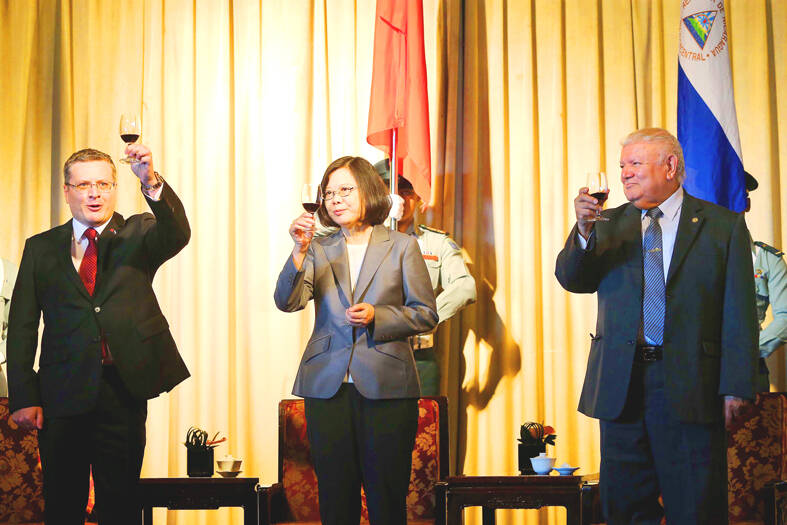Former Honduran ambassador to Taiwan Rafael Sierra yesterday criticized Honduran President Xiomara Castro’s bid to establish diplomatic ties with China, saying that severing relations with Taiwan would likely result in economic repercussions for his country.
Castro’s effort to switch diplomatic recognition from Taiwan to China is based on untruthful premises, Sierra wrote on Twitter, adding that it could harm the interests of farmers and more than 300 students receiving Taiwanese scholarships.
Salvadorans who moved to China on promises of scholarship were required to restart their studies from scratch, compelling many to return home empty-handed, Sierra said, referring to students enrolled in Taiwan when El Salvador switched recognition to Beijing in 2018.

Photo: CNA
Trade with Taiwan has been favorable to his country because of Taiwanese demand for melons, shrimp, coffee and other products from Honduras, he said.
As Costa Rica has discovered after establishing diplomatic relations with Beijing, China’s larger market does not necessarily result in more demand for Central American products, he said.
Taiwanese programs provide aid to many families in Honduras via agriculture technical assistance for avocado and potato seed production, and hog and floating cage fish farming, he said.
These families would face an uncertain future if the Taipei-run International Cooperation and Development Fund were to withdraw from the country, he said.
Fernando Ramos, a Honduran columnist who writes for Taiwanese media, told the Central News Agency that election challenges and fiscal woes might have influenced the Castro administration’s foreign policy with regard to Taiwan.
Castro’s announcement on Twitter of her intention to establish ties with Beijing likely signaled that a decision had already been made, Ramos said.
Honduras is facing a steep fiscal crisis that might jeopardize Castro’s election promises of infrastructure projects, which could fuel the opposition parties’ criticism of the government ahead of general elections next year, he said.
A meeting between Honduran Minister of Foreign Affairs Eduardo Enrique Reina and Chinese Vice Minister of Foreign Affairs Xie Feng (謝峰) in January was likely part of Tegucigalpa’s efforts to find new sources of funding for a dam project on the Patuca River, he said.
The resources Beijing could offer to infrastructure and energy projects in Honduras were a powerful incentive in contrast to Taiwan’s approach to foreign aid, which revolves around the soft-power domains of education, technology and vocational training, Ramos said.
Honduran students in Taiwan were alarmed by the potential threat to their scholarship programs, Ramos said, urging Taipei not to cut academic exchange programs.
Taipei has long conducted educational cooperation with countries that do not recognize it, and showing respect for the rights of Honduran students would demonstrate that Taiwan is not like China, he added.
Honduran lawmaker Tomas Zambrano, a high-profile critic of Castro, told a local TV channel that switching recognition would likely affect the country’s relationship with the US, its main trade partner.

The brilliant blue waters, thick foliage and bucolic atmosphere on this seemingly idyllic archipelago deep in the Pacific Ocean belie the key role it now plays in a titanic geopolitical struggle. Palau is again on the front line as China, and the US and its allies prepare their forces in an intensifying contest for control over the Asia-Pacific region. The democratic nation of just 17,000 people hosts US-controlled airstrips and soon-to-be-completed radar installations that the US military describes as “critical” to monitoring vast swathes of water and airspace. It is also a key piece of the second island chain, a string of

A magnitude 5.9 earthquake that struck about 33km off the coast of Hualien City was the "main shock" in a series of quakes in the area, with aftershocks expected over the next three days, the Central Weather Administration (CWA) said yesterday. Prior to the magnitude 5.9 quake shaking most of Taiwan at 6:53pm yesterday, six other earthquakes stronger than a magnitude of 4, starting with a magnitude 5.5 quake at 6:09pm, occurred in the area. CWA Seismological Center Director Wu Chien-fu (吳健富) confirmed that the quakes were all part of the same series and that the magnitude 5.5 temblor was

Taiwan will now have four additional national holidays after the Legislative Yuan passed an amendment today, which also made Labor Day a national holiday for all sectors. The Chinese Nationalist Party (KMT) and Taiwan People’s Party (TPP) used their majority in the Legislative Yuan to pass the amendment to the Act on Implementing Memorial Days and State Holidays (紀念日及節日實施辦法), which the parties jointly proposed, in its third and final reading today. The legislature passed the bill to amend the act, which is currently enforced administratively, raising it to the legal level. The new legislation recognizes Confucius’ birthday on Sept. 28, the

The Central Weather Administration has issued a heat alert for southeastern Taiwan, warning of temperatures as high as 36°C today, while alerting some coastal areas of strong winds later in the day. Kaohsiung’s Neimen District (內門) and Pingtung County’s Neipu Township (內埔) are under an orange heat alert, which warns of temperatures as high as 36°C for three consecutive days, the CWA said, citing southwest winds. The heat would also extend to Tainan’s Nansi (楠西) and Yujing (玉井) districts, as well as Pingtung’s Gaoshu (高樹), Yanpu (鹽埔) and Majia (瑪家) townships, it said, forecasting highs of up to 36°C in those areas